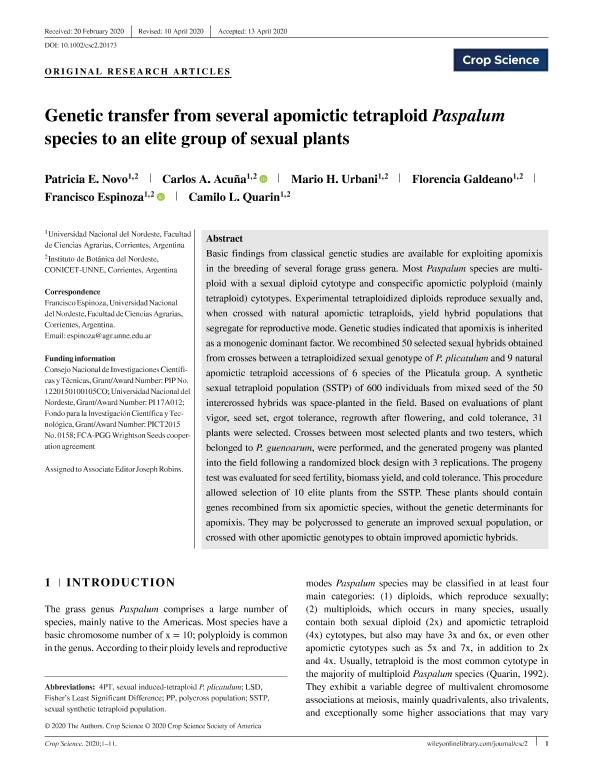Artículo
Genetic transfer from several apomictic tetraploid Paspalum species to an elite group of sexual plants
Novo, Patricia Elda ; Acuña, Carlos Alberto
; Acuña, Carlos Alberto ; Urbani, Mario Hugo; Galdeano, Florencia
; Urbani, Mario Hugo; Galdeano, Florencia ; Espinoza, Francisco
; Espinoza, Francisco ; Quarin, Camilo Luis
; Quarin, Camilo Luis
 ; Acuña, Carlos Alberto
; Acuña, Carlos Alberto ; Urbani, Mario Hugo; Galdeano, Florencia
; Urbani, Mario Hugo; Galdeano, Florencia ; Espinoza, Francisco
; Espinoza, Francisco ; Quarin, Camilo Luis
; Quarin, Camilo Luis
Fecha de publicación:
04/2020
Editorial:
Crop Science Society of America
Revista:
Crop Science
ISSN:
0011-183X
e-ISSN:
1435-0653
Idioma:
Inglés
Tipo de recurso:
Artículo publicado
Clasificación temática:
Resumen
Basic findings from classical genetic studies are available for exploiting apomixis in the breeding of several forage grass genera. Most Paspalum species are multiploid with a sexual diploid cytotype and conspecific apomictic polyploid (mainly tetraploid) cytotypes. Experimental tetraploidized diploids reproduce sexually and, when crossed with natural apomictic tetraploids, yield hybrid populations that segregate for reproductive mode. Genetic studies indicated that apomixis is inherited as a monogenic dominant factor. We recombined 50 selected sexual hybrids obtained from crosses between a tetraploidized sexual genotype of P. plicatulum and 9 natural apomictic tetraploid accessions of 6 species of the Plicatula group. A synthetic sexual tetraploid population (SSTP) of 600 individuals from mixed seed of the 50 intercrossed hybrids was space-planted in the field. Based on evaluations of plant vigor, seed set, ergot tolerance, regrowth after flowering, and cold tolerance, 31 plants were selected. Crosses between most selected plants and two testers, which belonged to P. guenoarum, were performed, and the generated progeny was planted into the field following a randomized block design with 3 replications. The progeny test was evaluated for seed fertility, biomass yield, and cold tolerance. This procedure allowed selection of 10 elite plants from the SSTP. These plants should contain genes recombined from six apomictic species, without the genetic determinants for apomixis. They may be polycrossed to generate an improved sexual population, or crossed with other apomictic genotypes to obtain improved apomictic hybrids.
Palabras clave:
paspalum
,
Apomixis
Archivos asociados
Licencia
Identificadores
Colecciones
Articulos(IBONE)
Articulos de INST.DE BOTANICA DEL NORDESTE (I)
Articulos de INST.DE BOTANICA DEL NORDESTE (I)
Citación
Novo, Patricia Elda; Acuña, Carlos Alberto; Urbani, Mario Hugo; Galdeano, Florencia; Espinoza, Francisco; et al.; Genetic transfer from several apomictic tetraploid Paspalum species to an elite group of sexual plants; Crop Science Society of America; Crop Science; 60; 4; 4-2020; 1997-2007
Compartir
Altmétricas



